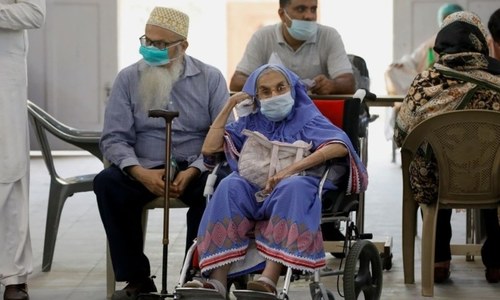ISLAMABAD: The Human Rights Commission of Pakistan’s (HRCP) annual report on the state of human rights in 2020 claimed that the government’s initial response to Covid-19 pandemic was marred by a lack of transparency and enforcement, whereas the authorities failed to enforce standard operating procedures in mosques as most religious bodies and mosque committees refused to comply with them.
The report was launched at the National Press Club on Wednesday by lifetime member Dr Nazir Mahmood along with council members Farhatullah Babar, Nasreen Azhar and Sadia Bukhari.
The report highlights that the year 2020 witnessed substantial human rights violations from forced conversions of religious minorities, accusations of blasphemy to crimes against women and enforced disappearances.
The HRCP documented at least 31 forced conversions in 2020, six of which involved minors.
Report claims 2020 witnessed cases of forced conversion, crimes against women
The report said police data showed that at least 586 people were booked on charges of blasphemy in 2020, with the overwhelming majority from Punjab.
At least six cases of forced conversion of Hindu girls were reported in the press - Mehak and Lata Kumari who were kidnapped from Jacobabad; Sormi and Shanti both kidnapped from Tharparkar, Simran from Pano Aqil and Parsha Kumari from Khairpur.
Abduction cases were filed in the courts and the girls were claimed to have solemnised their marriage in accordance with Shariah law.
The HRCP said alleged abduction, forced conversion and marriage of a minor Christian girl, Arzoo Masih, in Karachi in October indicated that the problem was not restricted to the rural Hindu community.
The right to worship freely continued to be constricted, and after the government announced that a Hindu temple was to be built in Islamabad, extremist groups and mainstream political parties allied with the government protested and vowed to prevent the construction.
The report highlighted that the Aurat Azadi March, which had obtained permission to hold a rally on March 8 from all authorities concerned, became a target of violence at the hands of religious people.
“The attack occurred because the authorities allowed the religious elements to hold a parallel rally in 2020, but this year they filed cases against the organisers of Aurat March,” Nasreen Azhar said.
However, Sadia Bukhari lauded the ‘Ehsaas Programme’ and the passing of Zainab Alert, Response and Recovery Act and the ICT Rights of Persons with Disability Act by the National Assembly.
The HRCP report 2020 was concerned that the key human rights institutions such as the National Commission for Human Rights and the National Commission on the Status of Women remained dysfunctional throughout 2020.
Regarding the status of women, the HRCP registered a rise in complaints of domestic and online violence, indicating the increased vulnerability of women during the pandemic.
Based on reports in the press, the commission recorded 430 cases of honour killing in 2020, involving 148 male and 363 female victims. Pakistan was ranked at 151 out of 153 by the World Economic Forum on the global gender gap index.
Worryingly, crimes against vulnerable groups such as children, women and religious minorities continued unabated.
The Commission of Inquiry on Enforced Disappearances also came under fire in a scathing review from the International Commission of Jurists, which criticised the commission’s failure to hold perpetrators accountable.
Published in Dawn, June 24th, 2021
















































